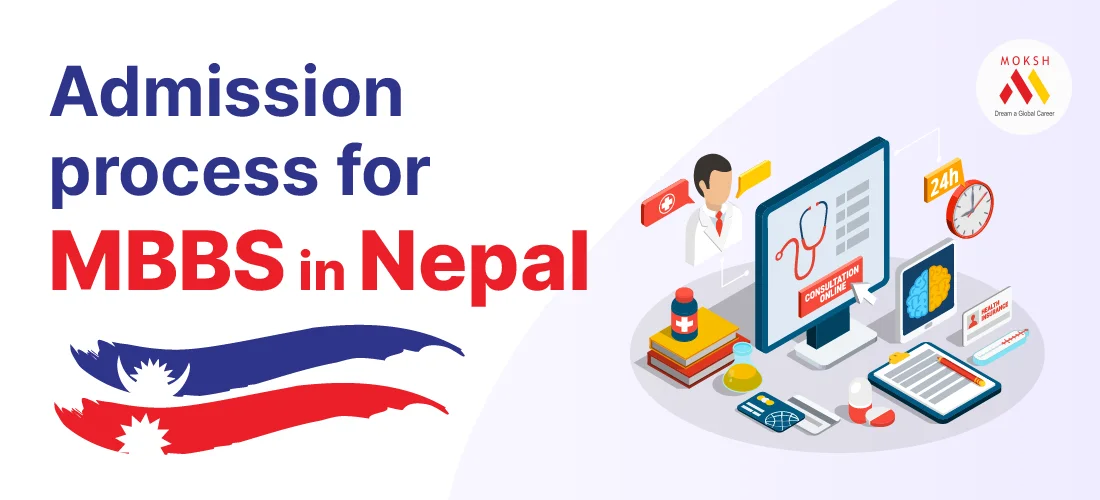
Introduction
Nepal has become a popular destination for pursuing an MBBS degree. The country's medical education system is well-regarded for its quality, affordability, and accessibility.
In this blog, we will give you a detailed overview of the admission process for MBBS in Nepal, covering key aspects such as eligibility criteria, entrance examinations, application procedures, and essential tips for prospective students.
Blog will help you direct the path to a successful MBBS career in Nepal, whether you're a domestic or international student.

Why Choose Nepal for MBBS?
Before getting into the admission process, it's essential to understand why Nepal is an attractive choice for medical education. Here are some reasons:
Quality Education: international bodies like the WHO and the Medical Council of India (MCI) recognise Nepal's medical colleges. This recognition means that the education provided meets global standards.
Affordability: The cost of medical education in Nepal is comparable less to many other countries, making it an economical option for students from various backgrounds.
Cultural Affinity: For students from other countries like India, Nepal offers cultural similarities and ease of communication, making the transition smoother.
Clinical Exposure: Nepal's diverse healthcare system provides students ample clinical exposure, which is crucial for their training and development as competent medical professionals.
Eligibility Criteria
The first step in the admission process is to ensure that you meet the eligibility criteria. The basic requirements for MBBS admission in Nepal are:
Educational Qualifications: Student must have completed their higher studies with Physics, Chemistry, Biology, and English as core subjects. A minimum score required is 50% in these subjects is typically required.
Age Limit: Candidates must be at least 17 years old at the time of admission.
Entrance Examination: Qualifying for admission in the relevant entrance examination (NEET) is mandatory.
Entrance Examinations
Several entrance examinations are conducted for MBBS admissions in Nepal. Some of the prominent ones include:
Medical Education Commission Entrance Examination (MECEE): Conducted by the Medical Education Commission of Nepal, this national-level exam is the primary gateway for MBBS admissions in various medical colleges across Nepal.
Institutional Entrance Exams: Some medical colleges in Nepal also conduct their own entrance examinations. It is advisable to check with MOKSH experts to get the right details.

Application Process
The application process for MBBS in Nepal involves several steps. Here's a step-by-step guide:
Research and Choose Institutions: Begin by using the MOKSH Career Planner app to research medical colleges in Nepal. Consider factors such as location, fee structure, facilities, and reputation. Popular medical colleges in Nepal include the Institute of Medicine (IOM), Kathmandu Medical College, and B.P. Koirala Institute of Health Sciences.
Check Eligibility and Prepare Documents: Ensure you meet the eligibility criteria and gather the important documents typical documents required include:
- Academic transcripts and certificates
- Proof of age (e.g., birth certificate)
- Passport-sized photographs
- Identification proof (e.g., passport for international students)
- Entrance exam scorecard
Register for Entrance Exams: Register for the relevant entrance examination. Follow the instructions given by MOKSH Career experts regarding the application process, fee payment, and exam date.
Prepare for the Entrance Exam: Adequate preparation is crucial for success in the entrance exams. We will update you regarding the study materials, question papers from previous years, and coaching if necessary.
Appear for the Entrance Exam: On exam day, ensure you have all the necessary documents and arrive at the exam center on time. Perform to the best of your ability.
Attend Counseling Sessions: Many colleges conduct counselling sessions for shortlisted candidates. During these sessions, you will have the opportunity to choose your preferred college and course. Make sure to attend MOKSH sessions for the right MBBS pathway.
Secure Admission and Pay Fees: Once you receive an admission offer, pay the admission fees to secure your seat. Be mindful of the deadlines to avoid complications.
Conclusion
Pursuing an MBBS degree in Nepal can be a rewarding experience. It offers quality education, diverse clinical exposure, and a culturally enriching environment. Following the steps outlined in this guide and staying focused on your future, you can successfully navigate the admissions process and embark on a fulfilling medical career. Good luck!







.png)



.webp)
